
| LEARN: Animals Food Humane Farming? Environment Conscience SHARE: Family & Friends Screenings Classrooms SUPPORT: Overview Films & Programs New Languages Teachers Culture-Builders |
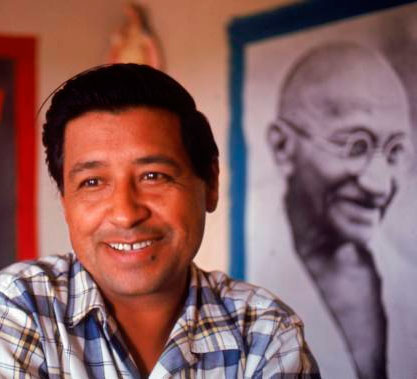
Some of history's most admired and respected social justice leaders struggled not just to achieve justice for marginalized and oppressed humans, but also for recognition and rectification of the injustices endured by our fellow animals. For example, both Mohandas Gandhi and Cesar Chavez are celebrated for their immense political achievements, but also equally admired for their humanity and life-affirming approach to transforming society. Each of these individuals was a pragmatist who saw the world with unblinking clarity. Yet their efforts were guided by their idealism and faith in humanity's ability to work together to create a more just and compassionate future. While Gandhi and Chavez lived in different eras and worked in different cultural contexts, both envisioned a future in which fairness, respect, and protection from exploitation would not only be considered the rights of all human beings, but of non-human animals as well.
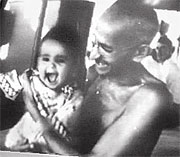 Mohandas Gandhi was a fierce advocate for the freedom and dignity of oppressed people everywhere. He was also a committed ethical vegetarian who once said: "I hold that, the more helpless a creature, the more entitled it is to protection by man from the cruelty of man."
Mohandas Gandhi was a fierce advocate for the freedom and dignity of oppressed people everywhere. He was also a committed ethical vegetarian who once said: "I hold that, the more helpless a creature, the more entitled it is to protection by man from the cruelty of man."
While Gandhi was raised in a vegetarian family in India, he followed the practice unevenly until adulthood, attempting to maintain a vegetarian diet partly to honor his mother's wishes. Gandhi's moment of true awakening to vegetarianism for personal moral convictions came when he dined at a vegetarian restaurant in London for the first time. He was deeply affected by a book he purchased at the restaurant called A Plea for Vegetarianism by the English philosopher Henry Salt. In this short volume, Salt described the practical and moral advantages of the vegetarian diet. He wrote, "How cruel to animals, and how degrading to men, is the institution of the slaughter-house… Those good people are mistaken who imagine that the slaughter of animals is painless and merciful."
Salt's book compelled Gandhi to consider the ethics of his diet in a deeper way, and to contemplate such issues as the violence inherent in taking an individual animal's life. He realized that non-violence could be maintained only by refraining from all participation, both direct and indirect, in the killing of animals. He believed it was wrong to ask others to do things that he himself would not do for reasons of principle. He once asserted that it is wrong to "force the butcher's trade on a portion of mankind" when one might "shrink with horror from such a calling." Gandhi later wrote about the life-changing impact of Henry Salt's book: "The choice was now made in favour of vegetarianism, the spread of which henceforward became my mission."
Gandhi eventually became a leading figure of the London Vegetarian Society and wrote numerous articles on the virtues and benefits of vegetarianism. During the same era he qualified as a barrister and accepted a position with an Indian law firm in South Africa, where he would spend the next twenty years advocating for the political rights of Indian migrants.
While in South Africa, Gandhi corresponded with Russian literary genius Leo Tolstoy, author of War and Peace, finding that they had much in common. In part based on his experiences as a soldier, Tolstoy had come to reject all forms of violence, and even connected the underlying causes of violence between humans to the violence done to animals. "As long as there are slaughterhouses," he wrote, "there will be battlefields." Gandhi's approach was also influenced by fellow vegetarian, Henry David Thoreau, the American philosopher and author of Civil Disobedience.
During the time he was in contact with Tolstoy, Gandhi pioneered many of the techniques of nonviolent resistance that would later form the basis of the successful campaign to free India of British colonial rule. The guiding principles of Gandhi's work were Satyagraha, "devotion to truth," and ahimsa, "nonharming," which together led him to courageously confront injustice through nonviolent means.
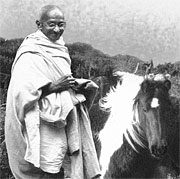 For Gandhi, a non-violent political philosophy led naturally to a respect and regard for others, human and nonhuman alike. He considered meat-eating a form of aggression, and encouraged others to live with compassion for all creatures. To this day, his legacy continues to inspire the efforts of justice advocates worldwide. He is famed for declaring, "The greatness of a nation and its moral progress can be judged by the way its animals are treated."
For Gandhi, a non-violent political philosophy led naturally to a respect and regard for others, human and nonhuman alike. He considered meat-eating a form of aggression, and encouraged others to live with compassion for all creatures. To this day, his legacy continues to inspire the efforts of justice advocates worldwide. He is famed for declaring, "The greatness of a nation and its moral progress can be judged by the way its animals are treated."
One of the many people whose lives were influenced by Gandhi's example was Mexican-American social justice advocate Cesar Chavez. Chavez was one of the 20th century's most admired opponents of socio-economic, racial, gender, and anti-immigrant discrimination. From a very early age, Chavez found inspiration and guidance in the writings of Gandhi, and later in life was able to adapt Gandhi's principles of non-violence and civil disobedience to the context of the struggle for farm workers' rights.
Born on a farm in rural Arizona in 1927, Chavez had daily contact with animals, and his mother taught him the importance of attending to the animals' needs before his own. Forced by the Great Depression to leave their farm in 1937, his family moved to California, and Cesar Chavez became a migrant farm worker at the age of 10. Although he had to drop out of school after eighth grade to support his family, Chavez was intellectually curious and very bright. At age 14, he discovered the work of Gandhi, whose struggle for non-violent social change and commitment to non-violence to animals through vegetarianism captured his imagination.
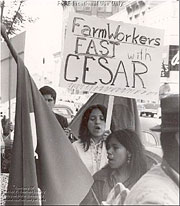 By the late 1940s, Chavez had found his calling, focusing on ways to empower exploited farm workers, immigrants, and their families. He taught migrant workers to read and write so they could become U.S. citizens, coordinated voter registration drives and eventually founded the farm workers association that would become United Farm Workers (UFW). As director of UFW, Chavez would go on to inspire millions of Americans to support farm workers by organizing boycotts and marches. He led a 5-year boycott and awareness campaign against major U.S. grape growers and successfully forced them to accept union contracts that would protect workers from injustices.
By the late 1940s, Chavez had found his calling, focusing on ways to empower exploited farm workers, immigrants, and their families. He taught migrant workers to read and write so they could become U.S. citizens, coordinated voter registration drives and eventually founded the farm workers association that would become United Farm Workers (UFW). As director of UFW, Chavez would go on to inspire millions of Americans to support farm workers by organizing boycotts and marches. He led a 5-year boycott and awareness campaign against major U.S. grape growers and successfully forced them to accept union contracts that would protect workers from injustices.
Throughout this long struggle for equality and civil rights, Chavez strictly followed Gandhi's principles of non-violence. With the passage of the years, Chavez's vision expanded and took his commitments to non-violence and compassion to their logical conclusion, opposition to the exploitation of animals. He was committed to educating others about vegetarianism and encouraged kindness and compassion toward animals in all aspects of life. "We need, in a special way," he said, "to work twice as hard to help people understand that the animals are fellow creatures, that we must protect them and love them as we love ourselves. The basis for peace is respecting all creatures."
Regarding his transition to vegetarianism, Chavez said: "I became vegetarian after realizing that animals feel afraid, cold, hungry and unhappy like we do. I feel very deeply about vegetarianism and the animal kingdom." In 1996, three years after Chavez's death, the director of United Farm Workers said, "Cesar took genuine pride in producing numerous converts to vegetarianism over the decades… He felt so strongly about it that sometimes I think he took as much personal satisfaction from converting people to vegetarianism as he did to trade unionism."
Cesar Chavez's extraordinary commitment to civil rights exposed him to the harmful and far-reaching consequences of systematic exploitation of those who are vulnerable. When it came to the use of animals, his position was clear and uncompromising. For him, it was not acceptable to commodify any being. "We know we cannot be kind to animals," he said, "until we stop exploiting them -- exploiting animals in the name of science, exploiting animals in the name of sport, exploiting animals in the name of fashion, and yes, exploiting animals in the name of food."
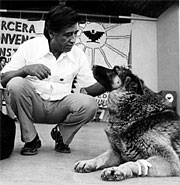 Like Gandhi and Tolstoy before him, Cesar Chavez's decades-long immersion in a struggle to overcome systematized injustice convinced him of the central importance of applying the values of respect, fairness and compassion to all, without qualification, and without prejudice. "Kindness and compassion, towards all living things," Chavez said, "is a mark of a civilized society."
Like Gandhi and Tolstoy before him, Cesar Chavez's decades-long immersion in a struggle to overcome systematized injustice convinced him of the central importance of applying the values of respect, fairness and compassion to all, without qualification, and without prejudice. "Kindness and compassion, towards all living things," Chavez said, "is a mark of a civilized society."
Copyright © 2016 Tribe of Heart Ltd.